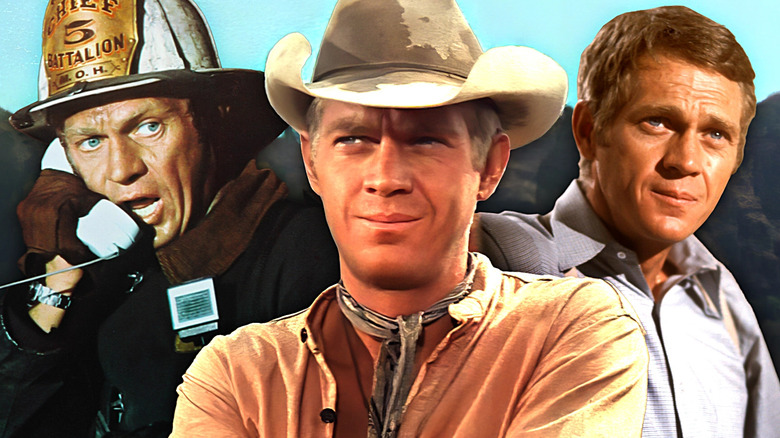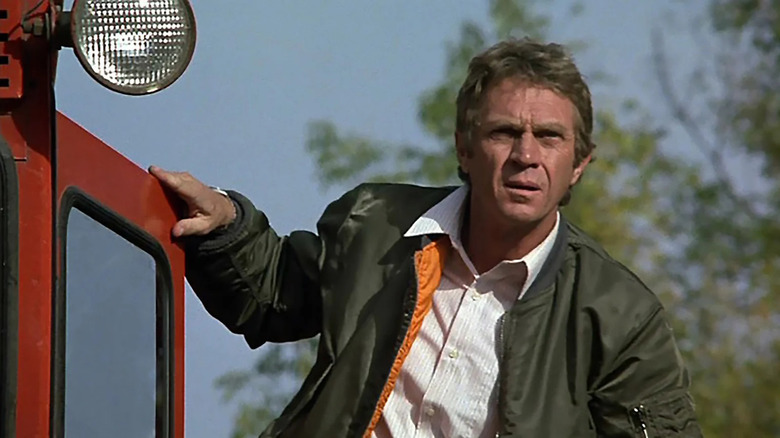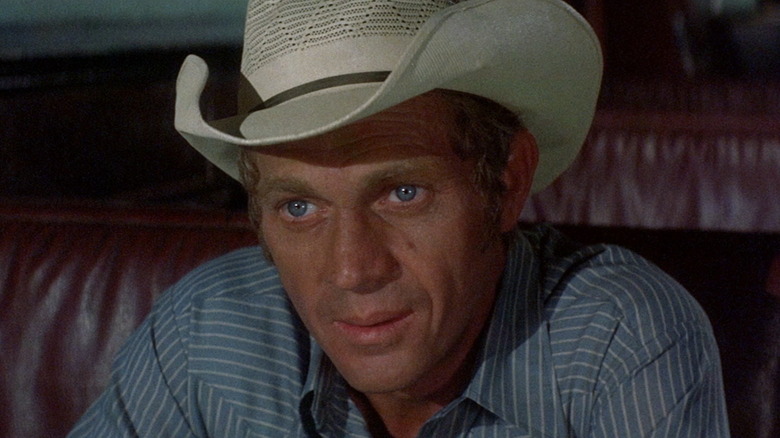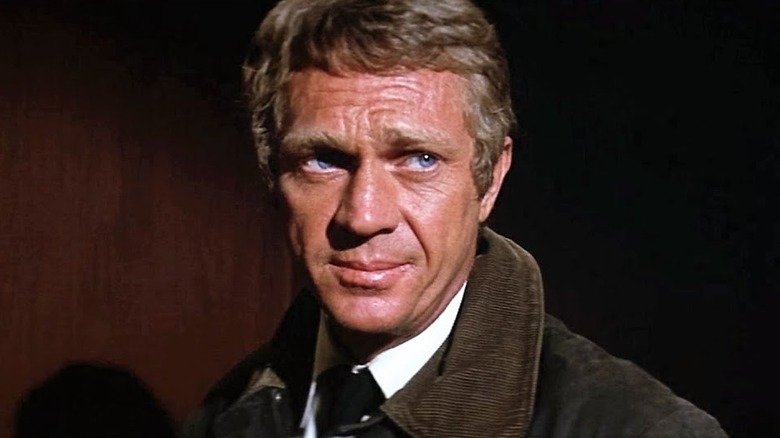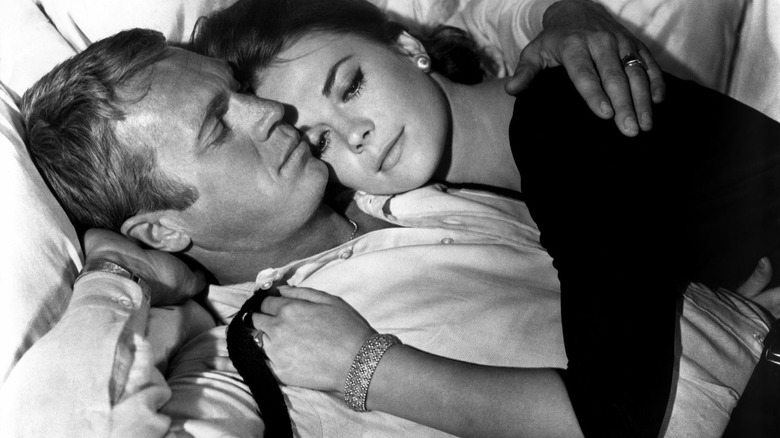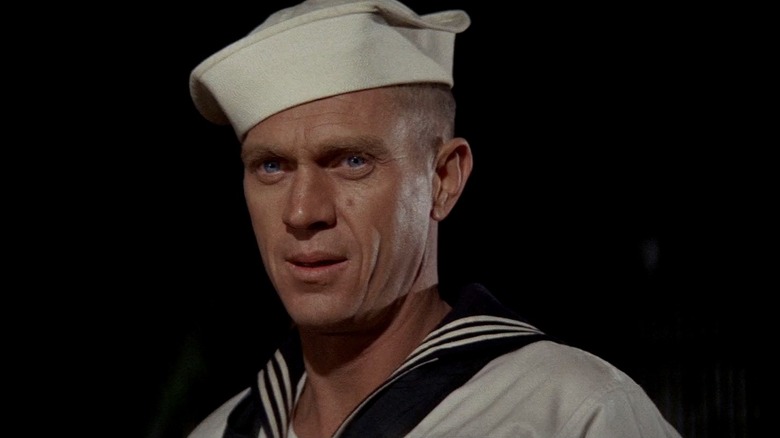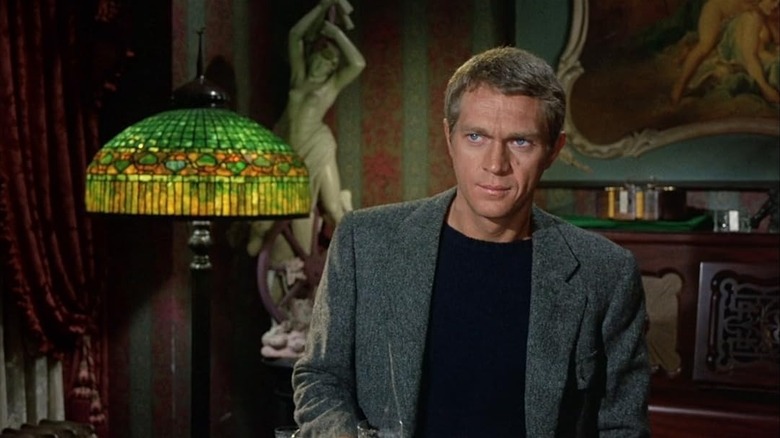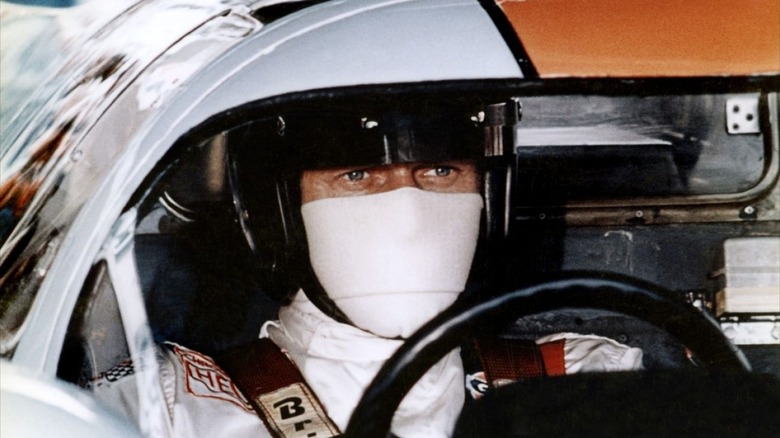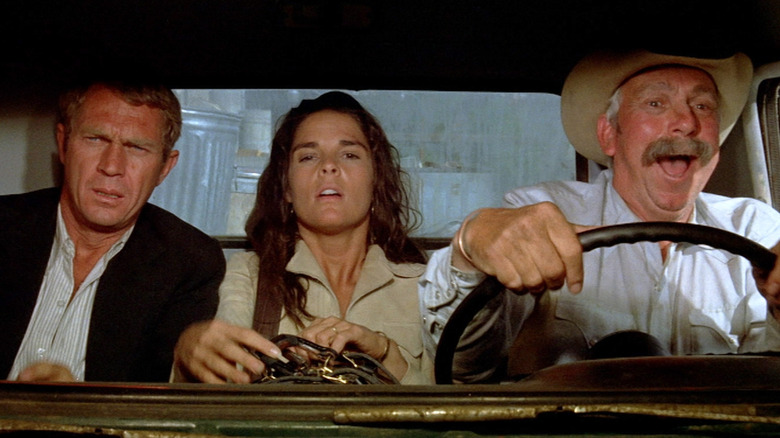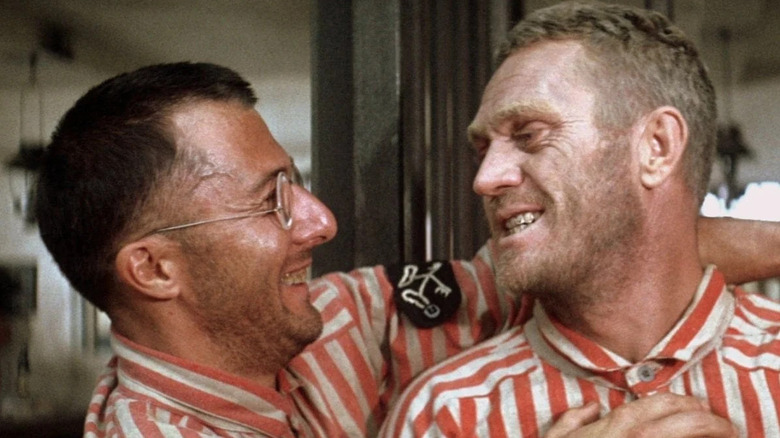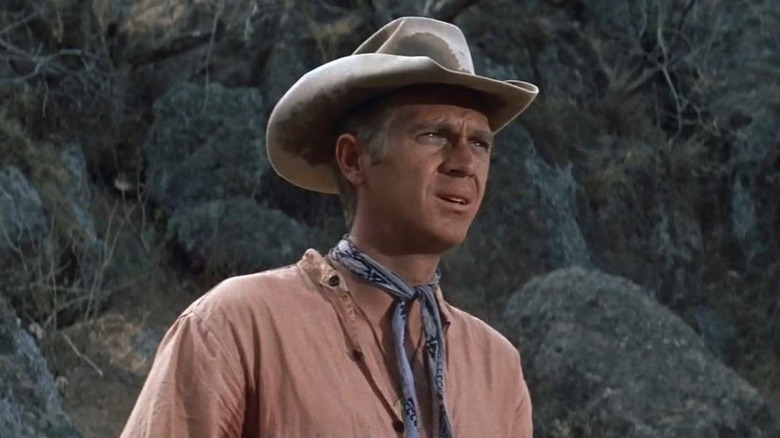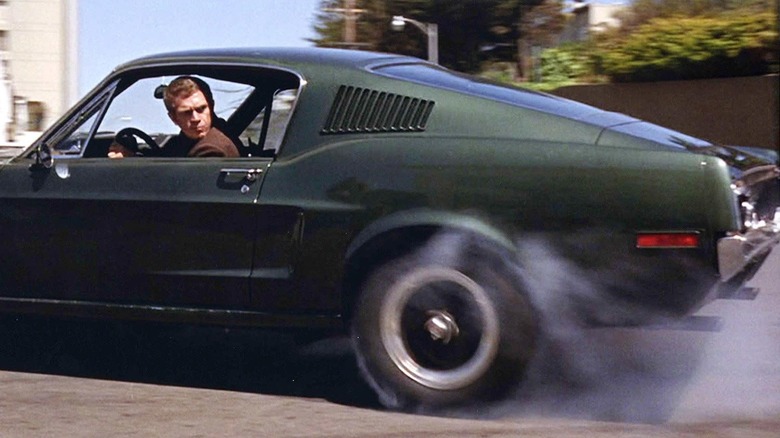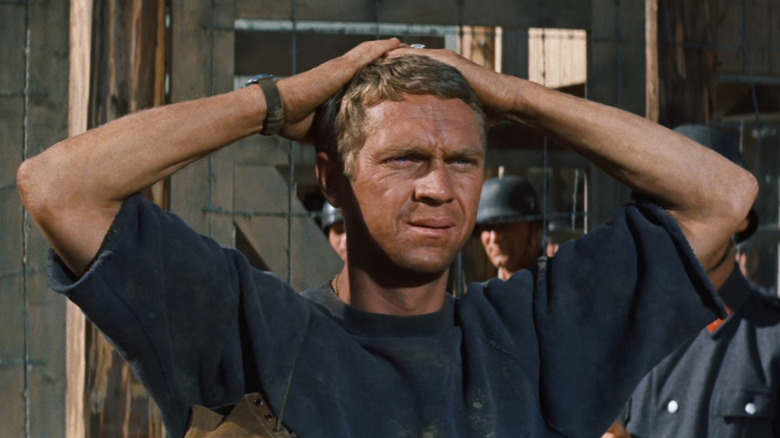12 Best Steve McQueen Movies, Ranked
When it comes to the biggest big screen stars of the 1960s and 1970s, even a short list would have to include Steve McQueen. He's rarely mentioned in the same acting league as contemporaries like Paul Newman and Robert Redford, but his early death in 1980 at just 50 years old is arguably the biggest reason for that. Still, even without later performances that would have surely continued to flex his acting muscles, his existing filmography shows an immense and interesting talent bristling with both energy and calm.
It's McQueen's control between the relaxed and the electric, along with his genuine and visible appreciation for life, that led to the actor being dubbed "the King of Cool." The persona served him well in roles that saw him playing underdogs and disrupters, men who refuse to abide by the established order and instead forge their own path, and it's part of what makes him an indelible and unforgettable screen presence.
McQueen entered the public consciousness as the star of a popular television western called "Wanted Dead or Alive," but it's the big screen where he became a legend, and here, we've assembled a list of Steve McQueen's 12 best movies.
12. The Hunter
He's been a bounty hunter for decades, but after catching thousands of criminals all over the United States, Ralph "Papa" Thorson is finally starting to realize that maybe, just maybe, he's getting too old for this s***.
Consensus wasn't that high on "The Hunter" when it hit screens back in 1980, and the sentiment only worsened when Steve McQueen passed away just a few months later. The film may not be the ideal send-off, but as McQueen himself suggested, there's a wonderful symmetry to kicking off a career as a TV bounty hunter and ending it as one on the big screen. This is still a fun, energetic movie that delivers a good time with a terrifically charismatic and personable lead performance.
Director Buzz Kulik gives the film an affable tone no matter the scene, and he finds a willing partner in McQueen, who moves with a casual coolness throughout. This isn't the cool of "Bullitt," though, as this is an old man who knows he's out of time — in both senses of the phrase — but indifferent to those who'd judge him for it. Papa chases down bad guys with an irked resignation, with one epic pursuit unfolding in Chicago with McQueen riding atop a moving train. It's lightweight, thrilling stuff, and it's worth your time as McQueen says goodbye with a smile.
11. Junior Bonner
Junior is a bronco-busting rodeo rider in the waning years of a career that's left him little beyond sore muscles, and his final ride is quickly approaching.
Sam Peckinpah was a filmmaker known for films featuring anarchic violence, misanthropic characters, and women who "should have known better," but his first collaboration with Steve McQueen delivers something far softer than anyone probably expected. "Junior Bonner" is a western of sorts, and like many in the post-modern era, it looks upon its cowboys as a dying breed. They faded away because the world no longer had room for them or need of them, and it's those same themes at play here in the lives of rodeo riders. That story comes with a pervading sense of sadness, but neither the film nor the characters ever really give in to it.
Like many of McQueen's characters over the years, Junior is a man who refuses to live wholly within the system. Every metric suggests he should retire, but Junior's holding on tight and hoping to do so for far longer than eight seconds. The truth stares characters and viewers in the face, but we cheer for him to succeed all the same. McQueen is the center of the film, but it's well worth a watch for a supporting turn from the great Ida Lupino as his long-suffering mother.
10. The Towering Inferno
San Francisco is home to a spectacle of modern architecture, a glass high-rise meant to impress anyone who visits or even sees it from afar. Unfortunately for those partying inside, though, it's also something of a safety hazard.
The 1970s birthed something relatively new with the big screen disaster movie. The subgenre quickly wore out its welcome, but for a short while there, we got prestige productions pairing incredible casts and real production value with epic destruction and melodrama. 1972's "The Poseidon Adventure" is arguably the best of the bunch, but John Guillermin's "The Towering Inferno" burns its way to a close second. Big stunts, fiery set-pieces, and plenty of drama heat up the high-rise, and it's all classed up by a cast of legends.
Paul Newman, William Holden, Faye Dunaway, Fred Astaire, Richard Chamberlain, Robert Vaughn, and Robert Wagner all see their night ruined, and it's Steve McQueen's San Francisco fire chief who comes to their rescue. Panic and fear spread even faster than the flames, but McQueen's patented cool infuses his character with calm and a grace under fire that serves the film well (though that didn't stop a rivalry from sparking with Paul Newman). It's the rare establishment authority figure role in McQueen's filmography — even his cops and bounty hunters are rogue elements — and he gives it an informed authority telling civilians and viewers alike that it's all going to be okay.
9. Love with the Proper Stranger
Their first date resulted in a pregnancy, and their second sees Angie and Rocky looking for an abortion doctor.
This is one of only two films in Steve McQueen's filmography that feels wholly atypical for the man — the other being 1978's "An Enemy of the People" which stars a bearded and bespectacled McQueen as a smalltown doctor trying to warn people about contaminated water. "Love with the Proper Stranger" stars McQueen as a jazz musician struggling to deal with the aftermath of a one-night stand with a young woman named Angie (Natalie Wood), and it's a blend of progressive social commentary, romantic drama, and comedy. There are moments both sweet and silly, even as other scenes feel stark or scary including a brief visit to a back-alley abortionist.
Family and social mores of the time are the pair's most obvious obstacle, but their biggest is the air between them. They're planning an abortion before they've even gotten to know each other, but they do just that in the process resulting in some humorous beats and affecting interactions. It all unfolds fairly naturally, and McQueen proves himself more than adept at playing a nice guy who wants to do the right thing, even before he truly knows what he wants.
8. The Sand Pebbles
It's the 1920s, and the U.S.S. San Pablo is patrolling a river in a rumbling China. The gunboat's engineer struggles to make sense of it all, even as the casual contradictions of war begin to overwhelm him.
The biggest hurdle "The Sand Pebbles" faces when it comes to attracting and earning new fans is its three-hour running time. It's a hefty investment, made even more tenuous thanks to a tone that feels uncommitted to the casual eye. Devote your time and attention to the film, though, and the ebb and flow of drama, action, commentary, and character all fall into a rhythm. The daily lives of American sailors and Chinese locals can breathe, and director Robert Wise is smart to keep viewers with them throughout instead of simply cutting out the calm, the erratic, and the ugly.
It's what gives the engineer his arc as Jake moves from a single-minded, casually racist, and wholly indifferent man to someone whose eyes begin to open. The down time allows him time to see the locals as people — as individuals — and the result is a shift in his motivation and methodology. The choices he makes grow increasingly humane and empathetic, and while this isn't some hugely dramatic swing, it's a noticeable change in one person as they relate to the next. Sometimes that's more than enough.
7. The Cincinnati Kid
From small back rooms to lavish hotel suites, the only size that matters to a poker player is the size of the pot. Eric Stoner is card phenom on the rise in Cincinnati, and his ego won't let him say no to a chance at beating a poker legend.
There's an unspoken rule that when discussing "The Cincinnati Kid" you have to also mention, as being superior, an earlier film about a young, game-playing hustler facing off against his elder. (Hint, it made our list of the best Paul Newman movies.) We won't be doing that, though, as Norman Jewison's poker drama stands on its own merit. Only the final hand is played for real suspense, but the poker scenes still enthrall thanks to a cast holding our attention rapt. Ann-Margret and Karl Malden are an unlikely couple caught up in a grift being orchestrated by a wonderfully malicious Rip Torn, and Edward G. Robinson brings a wise and knowing twinkle to the old pro threatened by a young gun with the juice.
Steve McQueen plays that young gun, obviously, and he uses his effortlessly cool persona to channel something more akin to self-confidence and a focused sense of ego. He can't lose because he's just that damn good, and it's almost as if he's willing things to go his way. A series of obstacles and challenges get in the way of that certainty, though, as his attempts at sidelining love and friendship in the name of winning reach a point of impact.
6. Le Mans
Michael Delaney is one of the top prospects at 24 Hours of Le Mans, despite being associated with a deadly crash from the year prior.
Automobile racing was a real-world passion of Steve McQueen's, and he longed to make a film celebrating the sport. Perhaps fittingly for the film's themes, bringing that vision to the screen saw McQueen burn through relationships with talents behind the camera including the film's original director, John Sturges, who previously helmed two of the star's biggest successes in "The Magnificent Seven" and "The Great Escape." McQueen didn't want a traditional Hollywood movie, and that desire ultimately contributed to him foregoing his salary in exchange for the film's completion and integrity.
The reception was tepid as critics and audiences wanted more plot and a "happy" ending, but time has been rightfully kind to "Le Mans" as viewers continue to come around to its thoughtful, intelligent approach to the sport and the mindset of its competitors. "When you're racing, it's life," says Michael, "Anything that happens before or after is just waiting." To that end, the film spends a lot of time free of dialogue — it's more than 30 minutes before the first real dialogue is spoken — as we instead take in the sights and sounds of the race on our way to an ending that finds real integrity amid the gas-powered ambition.
5. The Getaway
Carter McCoy is a career criminal behind bars, but when his wife helps secure an early release, he discovers that it comes with strings attached.
The second collaboration between director Sam Peckinpah and Steve McQueen is a film far more in line with the filmmaker's rough and tumble reputation than their first, but the end result still shows the steadying hand of its star (and would go on to become an unlikely influence on George Miller's "Mad Max"). McQueen stars opposite Ali McGraw as a husband and wife coerced into a robbery that immediately goes bad. Both the police and the crooks are on their trail, but their relationship remains their biggest challenge. Self-doubt and cold truths threaten their bond far more than any shotgun blasts can.
That marital bliss past the brink of dysfunction is the core of "The Getaway," its beating heart in more ways than one, but Peckinpah isn't making a simple drama here. This is a bloody, violent love story about a relationship tested by carnage, infidelity with purpose, and forgiveness gifted over corpses of your enemies. Shootouts are messy, squib-filled affairs where flesh, wood, and glass are blasted all over, but it's the pieces of their relationship that Carter and Carol (McGraw) are most interested in collecting and mending. It won't be easy and the odds are against them, but Slim Pickens is better than no pickens at all. (Note: This joke only works if you've seen the movie.)
4. Papillon
A burglar nicknamed Papillon is convicted of a violent crime he didn't commit, but he proves an elusive prisoner to keep in custody.
It's not difficult to see why two of Steve McQueen's most popular films feature him as a man determined to be free, but where "The Great Escape" ends on something of a downer, "Papillon" goes black on its star floating towards freedom. It's something of a necessary conclusion, I'd argue, as the preceding two hours plus offers a grueling litany of abuse, hopelessness, and the dampening of the human spirit. As bleak as things get, and they get pretty darn bleak, McQueen's Papillon is a man unbent who refuses to give up or give in, and it results in a draining but inspiring watch.
Papillon is the center of the film, but it's made clear that he's a man fueled and emotionally fed by those around him. Some people are helpful while others turn their backs on him, and he finds a partner at the center of it all in Dustin Hoffman's Louis Dega — another example of Hoffman's acting chops in a career filled with greatness. A shy man with resources and a need for protection, Dega is Papillon's reminder that compassion and kindness continue to exist. He's a reminder for viewers as well, just as Papillon encourages us to keep fighting no matter how long that journey takes.
3. The Magnificent Seven
Residents of a tiny Mexican village grow weary of a group of bandits who frequently swing by only to steal their crops, so a plan to hire gunslingers is hatched.
Remaking Akira Kurosawa's "Seven Samurai" may have seemed a foolish endeavor to some, but not only was Kurosawa himself influenced by American westerns, but "The Magnificent Seven" is also a classic that stands on its own boot heels as one of the best westerns of all time. Key to its success is an ensemble of big screen stars on the rise, including Yul Brynner, Charles Bronson, James Coburn, Robert Vaughn, and of course, Steve McQueen. Each brings their own brand of charisma, and each stands out through some combination of bravado, appearance, and skillset. Add in Eli Wallach as the head Mexican bandit (I know, I know, but it was a different time!), and you have an epic collision of talent and testosterone.
McQueen is third-billed and plays sidekick to Brynner's lead, but even here his casual coolness oozes outward with his every scene. Some gunslingers crave financial reward, while others are more interested in chasing the action and while McQueen's Vin is in the latter camp he's an action junkie with a conscience. This was his first big screen western after becoming a TV star with "Wanted Dead or Alive," and it's what gave him enough of a bump to leave the small screen behind for good.
2. Bullitt
A state's witness is gunned down while in police custody, and the higher-ups are upset over how it makes them look. For a cop named Bullitt, though, the anger he feels is far more personal.
Look at any list of the best car chases in cinema, and the one featured in "Bullitt" is guaranteed to be revving its engines near the top. It's an impressive feat, especially for a film that's over half a century old. The secret sauce here is a combination of factors including San Francisco's beauty and breadth as a physical, tangible backdrop for the action. Director Peter Yates also lets the chase breathe, free of dialogue and score for the most part, as we move from busy city streets to scenic, desolate stretches.
That chase is all too many viewers remember, and that's both understandable and unfortun,ate as the film itself is a classic for more than just the car action. It's a dense procedural that sees Bullitt and his team doing the grunt work to solve their case and catch the bad guys, and Steve McQueen is at his steely-eyed, cool as hell best. The supporting players include the welcome likes of Robert Vaughn, Jacqueline Bisset, Norman Fell, and Robert Duvall, and it all culminates in a thrillingly tense airport set piece — again, mostly free of dialogue and score — that feels like an obvious inspiration for the ending of Michael Mann's "Heat."
1. The Great Escape
World War II rages, and the Nazis are collecting Allied POWs like trading cards. One prisoner of war camp is deemed escape-proof by German command, but nobody thought to tell the prisoners.
Steve McQueen had a television series and co-starred in "The Magnificent Seven," but it's "The Great Escape" that truly launched him into super stardom. It's a showy role that McQueen fills with guts and charisma, and the character's journey from self-interest to self-sacrifice remains as powerful today as it was 60 years ago. The dangerous motorcycle chase and fence jump thrill so successfully that it's easy to forget, each and every time you watch, that it still ends in his recapture. What viewers don't forget, though, is the character's resilience in the face of oppression — something that sadly feels timely even today.
McQueen is just part of the film's overall appeal and brilliance. Director John Sturges, who previously corralled McQueen, Charles Bronson, and James Coburn with "The Magnificent Seven," once again shows a masterful control over an ensemble heavy with personalities. James Garner, Richard Attenborough, Donald Pleasance, and more help bring the rousing story to life resulting in a thrilling tale and one of the great prison escape films. Knowing it's loosely based on real events adds additional weight to its themes of courage, honor, and integrity, and it makes the film all the more relevant in today's climate.
